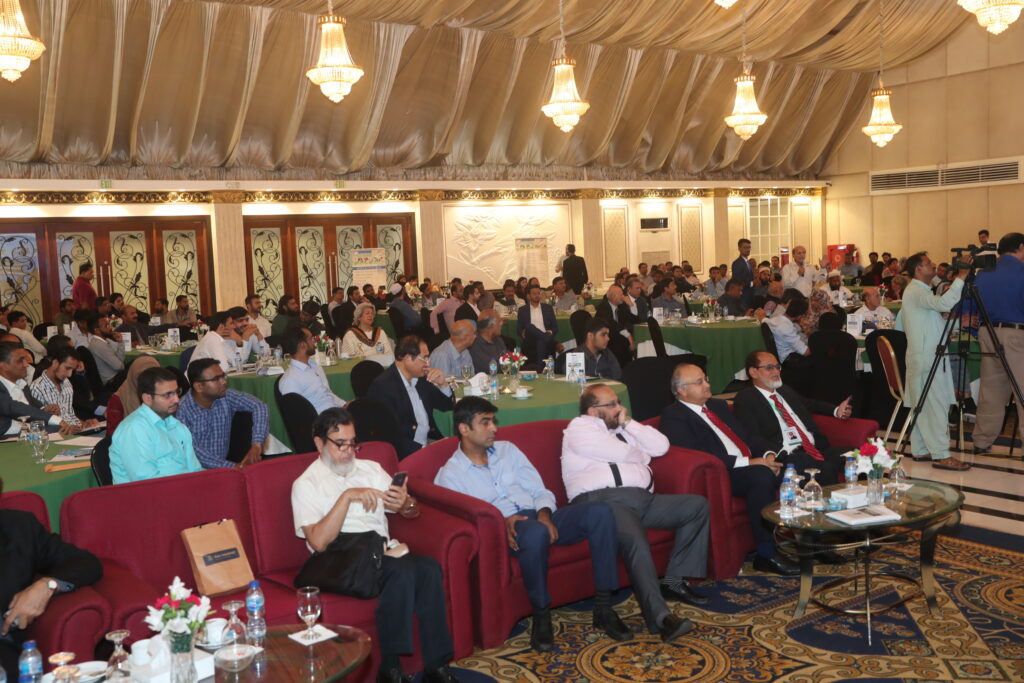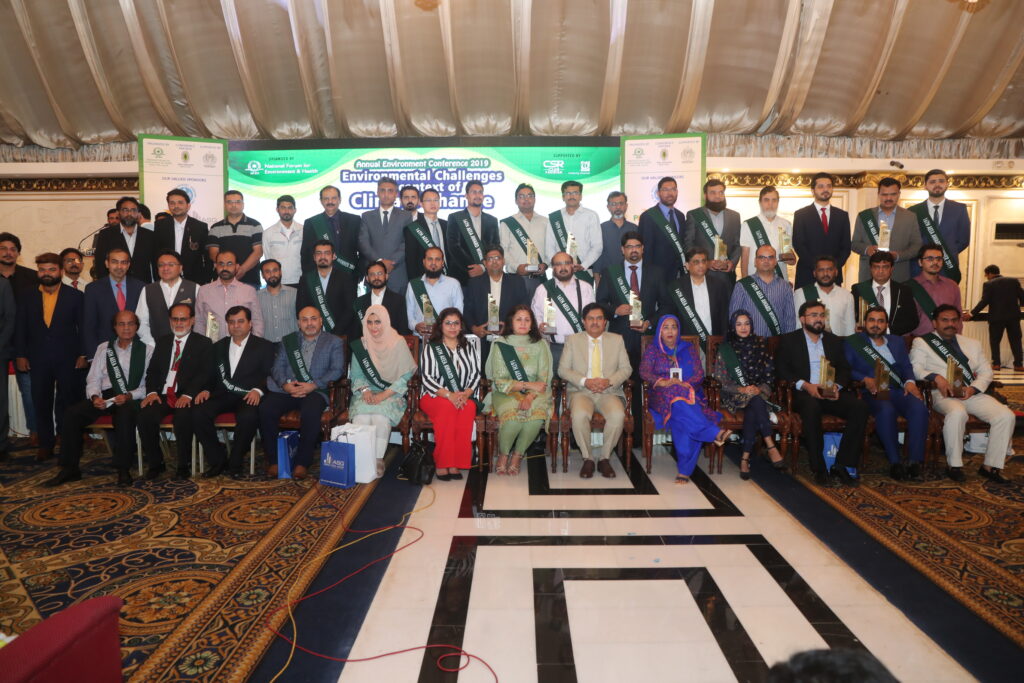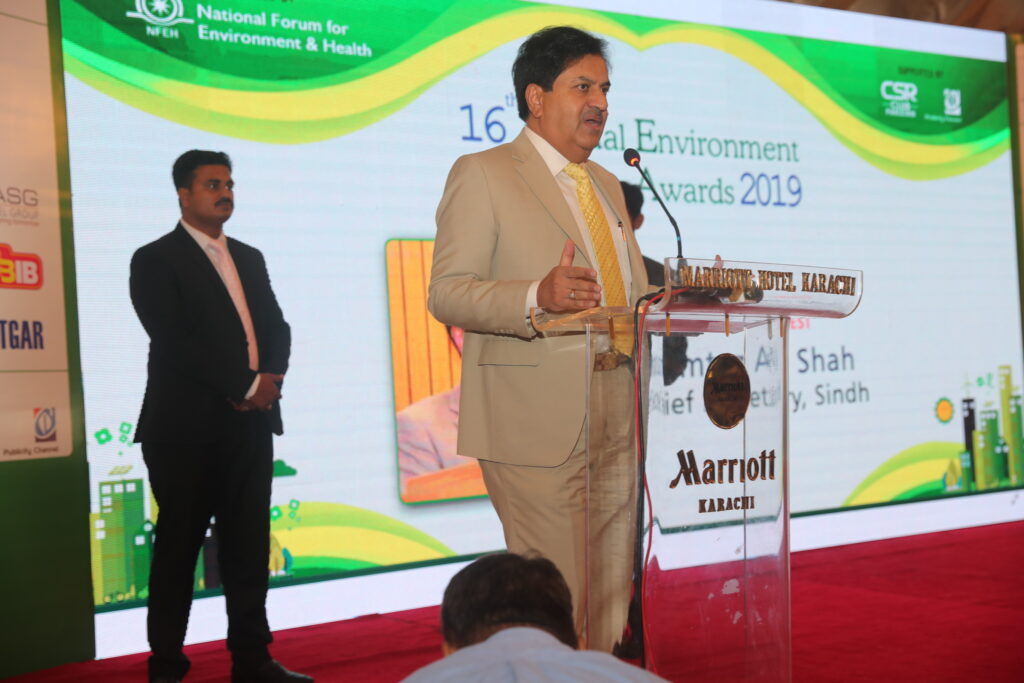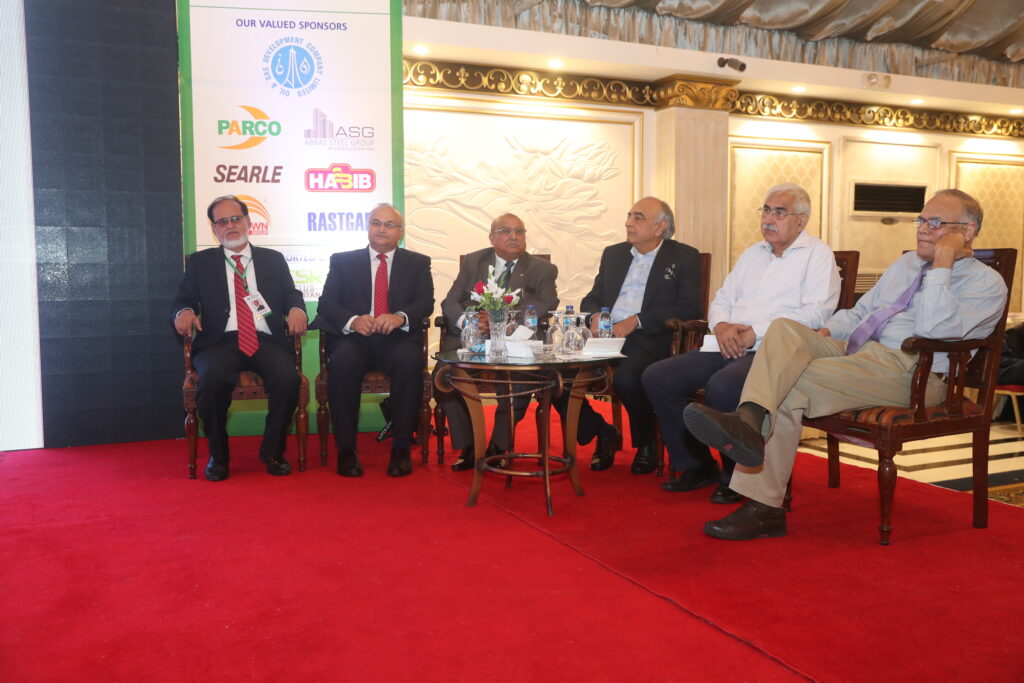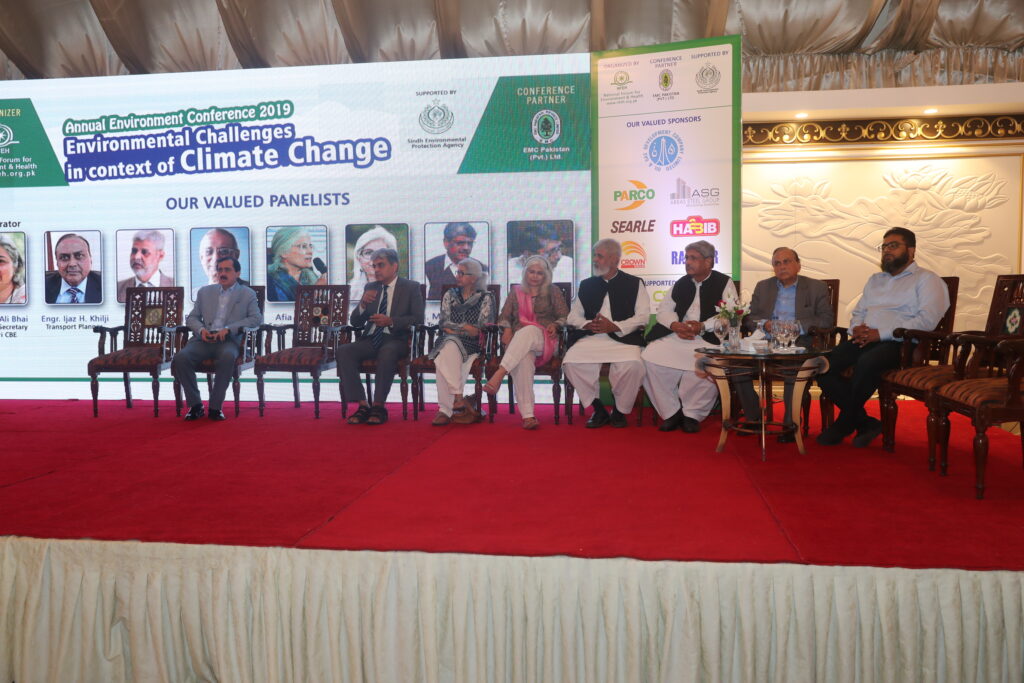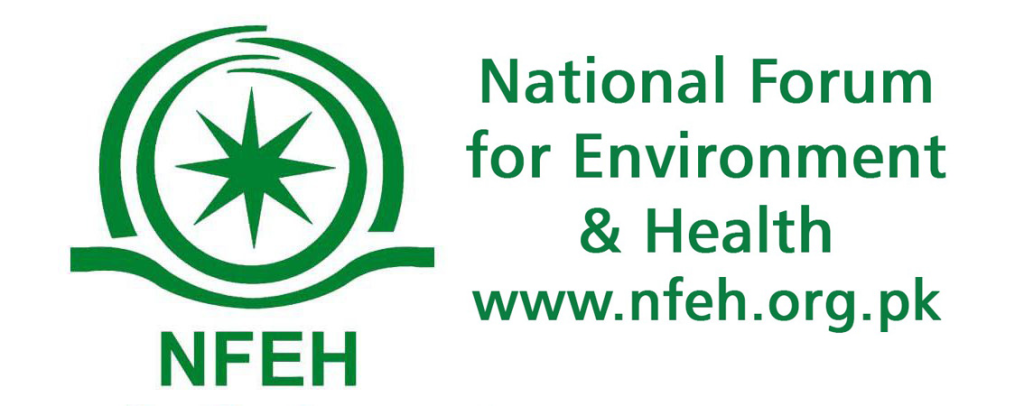Karachi: Glimpse of Speakers at Annual Environment Conference 2019. From Left to Right Javed Jabbar Former Minister Information, Capt. Fahim uz Zaman Khan Former Administrator Karachi, Shams Ul Haq Memon, Nauman Khan NED, Syed Nadeem Arif CEO EMC & M. Naeem Qureshi President NFEH.
Annual Environment Conference-2019
Provinces urged to beef up efforts to protect environment in post-18th Amendment era
Karachi
The provincial governments before wasting any more time should assume their responsibilities pertaining to the protection of environment in the light of 18th Constitutional Amendment as there is no obstruction in the way of the provinces to do their part to contain the phenomenon of climate change.
This was one of the demands contained in the keynote address of Annual Environment Conference-2019 delivered by former Federal Information minister and noted scholar Javed Jabbar. The National Forum for Environment and Health (NFEH) in collaboration with Environment Management Consultant organized the conference.
“The provinces should strengthen their institutions and provide resources to protect the environment in the light of the powers they gained after the 18th Constitutional Amendment. Nobody is stopping the provinces from doing so,” said Mr. Jabbar on the occasion.
He said that the provinces had no choice other than to play this role in the light of the responsibilities passed on to them after the 18thAmendment. “There exists Environment Department in the provinces as it needs to the strengthened. Till now the situation is such that the ministry of Environment Department in the provinces is given to someone either as an act of punishment or charity as this trend needs to be changed,” he said.
The former federal minister said that provinces should enact more effective laws for serving the cause of the environmental protection in best of the manner.
Mr. Jabbar said that population welfare was another aspect whose responsibility should be assumed by the provinces in the light of their increased role in governance.
He said that population growth rate had a direction relation with the situation of environmental degradation in terms of availability of resources, which are vital for human life.
“It would be grave oversight on the part of the authorities concerned if they are ignoring the impact of population on the environment,” he said.
He said that only 35 per cent of the married couple in Pakistan use contraceptives, which is way too less practice of population control methods as compared to much higher prevalence of contraceptives in the nearby countries of Iran, Turkey, and Bangladesh all having Muslim majority population.
“One should keep in mind that Pakistan was one of the earliest countries in the Asian region, which adopted a population control policy in the decade of 1960s,” he said.
Also speaking on the occasion, Prof Dr Noman Ahmed of Department of Architecture and Planning of the NED University of Engineering & Technology, mentioned a recent statement of Commissioner Karachi according to whom there were 1578 designated public parks in the city as nearly half of them were encroached.
He said that clearing these parks of encroachments was not an easy task as human settlements were involved in many of such instances whose eviction would cause a major social uproar.
He said that if in case all the proposed seven lines of the Bus Rapid Transit Service were built and made operational in Karachi then they would only cater to eight per cent passenger traffic that had to rely on commuter services daily in the city.
He said that a fresh city-wide plan should be adopted at the earliest so to tackle the ever exacerbating civic issues of Karachi in view of its depleting resources.
He said that Karachi had been once gifted with strong leaders in the pre-partition era who acted as mayors of the city. “The institutions of the city were also strong in that era, which is no more the case. Now Karachi lacks both strong leaders and municipal institutions,” he said.
Former Administer Karachi Captain Fahim Zaman Khan said the census of 1998 showed that there were just 300,000 four-wheelers in Karachi whose number had increased to 3.5 million in the census of 2017. Similarly there were 1.4 million two-wheelers in Karachi whose number had increased to 3.1 million in 2017.
While the census of 1998 had showed that there were 22,000 public buses in Karachi whose number had decreased to 10,000 to 12,000 in the census of 2017.
Acting President of FPCCI Dr Mirza Ikhtiar Baig said that fuel mix being used in the country to generate electricity had been proving too costly for the national economy and also causing damage to the environment due to heavy reliance on conventional resources of energy.
He said that there were 5,000 glaciers in the Himalayas, which feed to the Indus River as the melting of these glaciers had started fast due to the phenomenon of global warming.
He lamented that work on the K-IV bulk water project for Karachi had been stopped for last eight months as the design and cost of the scheme was being re-evaluated as in such a situation people of the city had to gravely suffer due to the shortage of the water resource.
Advoate Shahab Usto emphasized that Supreme Court-mandated commission on water and sanitation issues in Sindh should continue its work as projects initiated by it would go a long way in serving the cause of environmental conservation.
He said that the Water and Sanitation Commission had identified 750 points all over the province where sewage was being mixed with fresh water resource as 190 of them already been addressed.
He said that owing to the efforts of the Water Commission, industries of the province had given written undertakings to install pre-treatment effluent plants at their sites individually as earlier the Sindh Environmental Protection Agency had completely failed to discharge such responsibilities.
NFEH President Naeem Qureshi urged the provincial governments to empower their respective environmental protection agencies so that a cohesive nation-wide action could be initiated to tackle the damaging phenomenon of climate change.
Addressing the concluding session of the event as its chief guest, Sindh Chief Secretary Mumtaz Ali Shah said that provincial governments of Pakistan were very much onboard in the efforts being done nationally and all over the world to address the issue of climate change.
He said that one instance of such efforts was that no development project sponsored by any of the provincial government could be launched without conducting its prior Environmental Impact Assessment Study.
He said that Sindh government would allocate maximum resources and do best of its efforts to ensure best environmental practices in all development projects being undertaken in the province.
Sindh Chief Secretary also awarded 16th Annual Environment Excellence Awards-2019 to some 52 companies and organizations for observing best environmental practices during one last year.
Other speakers of the event include KCCI President Junaid Makda, Amber Ali Bhai, Saquib Ejaz Hussain, Syed Nadeem Arif, Hasan Bakshi Chairman ABAD, Moazzam Ali Khan Environmentalist, Rafi ul Haq Ecologist, Sham ul Haq Memon, Zofeen T Ebrahim, Afia Salam, Khalid Iqbal, Engr. Nadeem Ashraf, Ijaiz Hussain Khilji and others.
